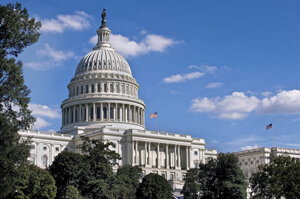Journalism Competition and Preservation Act Introduced in Congress


Last year, the National Association of Broadcasters submitted a filing with the House Judiciary Subcommittee on Antitrust, Commercial, and Administrative Law detailing how digital platforms’ overwhelming competitive position puts broadcasters at a disadvantage for advertising revenue and impedes broadcasters’ ability to effectively monetize their own content online.
“NAB commends Reps. David Cicilline and Ken Buck, Sens. Amy Klobuchar and John Kennedy and their bipartisan cosponsors for reintroducing legislation allowing news publishers such as local broadcasters to collectively negotiate the terms on which their content may be distributed online,” said NAB President and CEO Gordon Smith about this bill’s introduction.
“For too long, a handful of dominant tech platforms have unilaterally set policies impeding media outlets’ ability to reach audiences, attract advertisers and monetize their news content. The Journalism Competition and Preservation Act would afford news producers the ability to negotiate a fair return for their local journalism that serves America’s communities. We look forward to working with stakeholders and members of Congress on passing this legislation into law.”
More information about NAB’s position regarding the impact of technology companies’ marketplace power on local journalism can be found here.
Emily Barr, president and CEO of Graham Media Group, was scheduled to testify on behalf of local television and radio broadcasters at the Subcommittee’s hearing titled “Reviving Competition, Part 2: Saving the Free and Diverse Press” today (3/12) at 10 a.m.
The Journalism Competition and Preservation Act would establish a temporary, 48-month safe harbor that allows small news publishers to negotiate collectively with online platforms to protect Americans’ access to trustworthy sources of news online. Importantly, the safe harbor is narrowly-tailored to ensure that coordination by news publishers is only in the interest of promoting trust and quality journalism.
The bill only allows coordination by news publishers if it (1) directly relates to the quality, accuracy, attribution or branding, or interoperability of news; (2) benefits the entire industry, rather than just a few publishers, and is non-discriminatory to other news publishers; and (3) is directly related to and reasonably necessary for these negotiations, instead of being used for other purposes.
